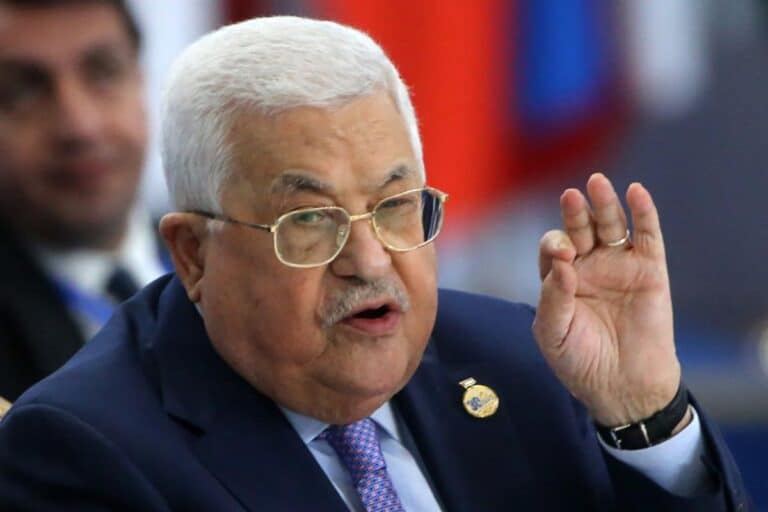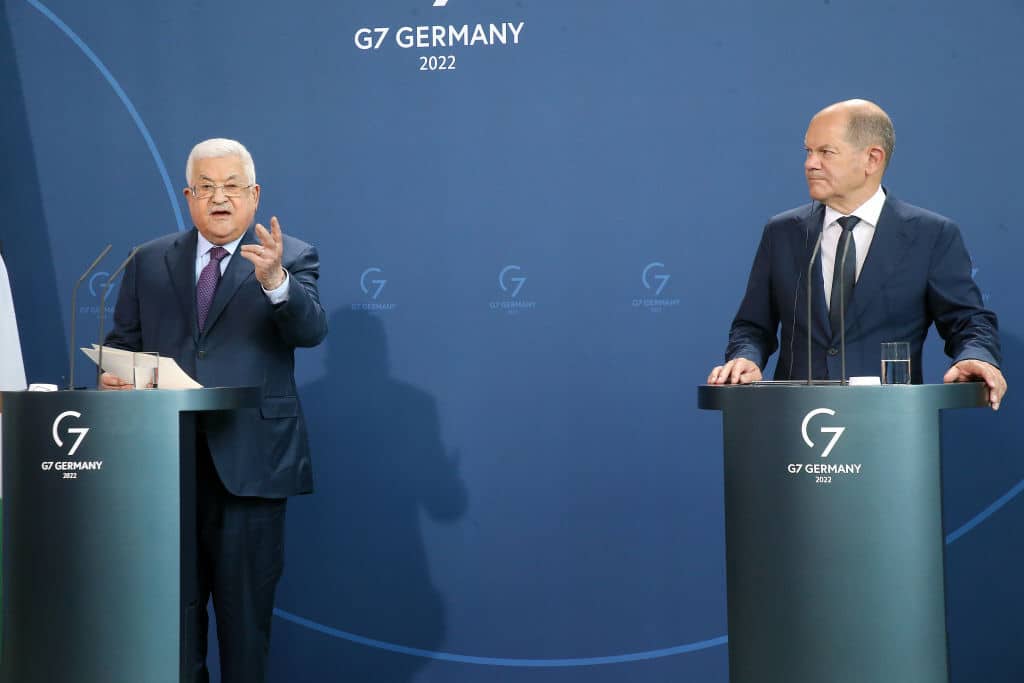
Last month, Palestinian Authority President Mahmoud Abbas caused a firestorm when he said that Hitler murdered 6 million Jews not because of antisemitism, but because of their “social roles” as moneylenders, in a speech to members of his Fatah political party.
In response to his comments, the city of Paris rescinded its award of the Grand Bronze of Paris from Abbas, the city’s highest honor.
Paris Mayor Anne Hidalgo wrote in a letter that Abbas’ “remarks run counter to universal values and the historical truth of the Holocaust.”
Abbas’ statements have received widespread backlash and brought his decades of pushing of Holocaust conspiracy theories to the forefront.
So, this week, we wanted to unpack what Abbas said, his history of Holocaust denial, and reactions from the Jewish world and international community.
Jews and moneylending: A longstanding antisemitic trope
First, let’s unpack what Abbas actually said in his speech, and why these statements are unfounded and deeply problematic.
“They say that Hitler killed the Jews because they were Jews and that Europe hated the Jews because they were Jews. Not true. It was clearly explained that [the Europeans] fought [the Jews] because of their social role, and not their religion,” Abbas said in August.
“The [Europeans] fought against these people because of their role in society, which had to do with usury, money and so on and so forth,” the Palestinian leader added.
His assertion that Jews were killed in the Holocaust due to their “social roles” reflects long-standing antisemitic claims of Jewish money, wealth, and greed.
In medieval Europe, Jews were not allowed to own land, and thus began careers in trades — like banking — which were considered inferior.
Christian rulers often recruited Jews specifically for these roles, as Christians were not allowed to take money-lending roles that charged interest for loans. This laid the groundwork for an antagonistic relationship between many Jewish and Christian communities in Europe.
Major nobles in debt could stir up popular resentment and initiate violent anti-Jewish riots just to get out of repaying loans.
Kings who owed their Jewish subjects too much could and did simply default on their loans, kick the Jews out, and confiscate their property, and then re-invite them after they’d used up all their funds and needed more loans.
Abbas’ statements also reflect historical, antisemitic tropes of Jews “controlling” banks and exerting secret control over society. For centuries and leading up to the Holocaust, political cartoons portrayed Jews as money-grubbing and controlling the systems of commerce.
One person who is often at the center of these antisemitic conspiracies is the investor and philanthropist George Soros.
In May 2022, a Republican candidate for Minnesota’s secretary of state depicted him as a puppet master in her campaign video, suggesting that he secretly controls elections. In addition, in 2021, Fox News faced backlash for sharing a similar puppeteer cartoon.
The Khazarian Hypothesis: False claims about the origins of Ashkenazi Jews
Abbas also said in his speech: “The truth that we should clarify to the world is that European Jews are not Semites.”
“They have nothing to do with Semitism…. So when we hear them talk about Semitism and antisemitism, the Ashkenazi Jews, at least, are not Semites.”
This was not the first time Abbas promoted what is known as the “Khazarian Hypothesis,” a false conspiracy theory dating back to the 1800s about the origin of Ashkenazi Jews.
According to the theory — which has been thoroughly debunked by scientific, historical, linguistic, and other evidence — Ashkenazi Jews are not the descendants of the biblical Israelites.
Instead, this theory claims, they are descendants of the Khazars, a Turkic-speaking people in the Middle Ages who are thought to have converted to Judaism at the instruction of their ruler.
Proponents of this idea hold that the Jews did not migrate from Jerusalem and Babylonia into Western Europe but instead came from what is now Russia and Ukraine (where the Khazars had established a powerful state in the 600s).
This theory — which has also been mobilized by Kanye West, Louis Farrakhan, and the Black Hebrew Israelite Movement — ignores anthropological, archival and archeological evidence of a continuous Jewish presence in the land of Israel, including an Ashkenazi Jewish one, for thousands of years, with many later migrating to Europe and North Africa.
Railing against the Balfour Declaration
Abbas also made incendiary comments about the 1917 Balfour Declaration, in which then-British foreign minister Lord Balfour called for a “national home” for the Jewish people in the land of Israel.
Abbas claimed that the idea of a Jewish state was concocted by Great Britain and the United States:
“Who invented the [Jewish] state? It was Britain and America, not just Britain. I am saying this so that we know who we should accuse of being our enemy, who has harmed us and took our homeland away, and gave it to the Israelis or the Jews.”
The British used the Balfour Declaration — which was crucial in the establishment of the state of Israel — to gain control of Palestine by ousting the Ottoman Empire.
The Balfour Declaration was the first major international recognition of the right to a Jewish home in the Jewish nation’s ancestral homeland.
According to the ADL’s Kenneth Jacobson, Abbas’ claims follow “a pattern of Palestinian rejection of Jewish connection to the land of Israel.”
“The Balfour Declaration not only promised the Jewish people a homeland in Palestine, it based it on that historic connection. So, Abbas is now doubling down on disconnecting Jews from the Holy Land,” he wrote after Abbas made similar statements in 2016.
Abbas’ long history of Holocaust denial
This is far from the first time that Abbas has made controversial statements about the Holocaust.
In 1984, Abbas published a book in which he falsely claimed that Zionists “manufactured” the Holocaust in order to promote immigration to Israel.
He also questioned the death toll of 6 million Jews in the Holocaust in the book, claiming that the figure may have been less than one million.
In May, Abbas compared Israeli rhetoric to Nazi propaganda and called for Israel to be ousted from the U.N. More specifically, he likened Israeli claims of farming and cultivating the desert land to propaganda by Joseph Goebbels, who served as the Third Reich’s chief propagandist.
Last August, during a press conference with German Chancellor Olaf Scholz, Abbas was asked if he would like to apologize for the 1972 Munich Massacre, in which Palestinian terrorists associated with Fatah, the political party that Abbas leads, murdered 11 Israeli athletes at the Olympics.

Abbas refused to apologize and instead compared Palestinian treatment under the Israeli government to the Holocaust, saying:
“From 1947 until today, Israel has committed 50 massacres in 50 Palestinian villages,” he said. “Fifty slaughters. Fifty Holocausts.”
It’s true that in 2014, Abbas called the Holocaust “the most heinous crime to have occurred against humanity in the modern era.” But the point is that his statements trivializing the Holocaust are nothing new.
Reactions to Abbas’ statements
The international community overwhelmingly condemned Abbas’ statements.
Israeli Ambassador to the U.N. Gilad Erdan said that Abbas “blames the Jews for the Holocaust” and called for the international community to hold him accountable for his remarks.
U.S. Special Envoy to Combat Antisemitism Deborah Lipstadt also condemned his remarks as “hateful” and “antisemitic”:
“The speech maligned the Jewish people, distorted the Holocaust, and misrepresented the tragic exodus of Jews from Arab countries,” Lipstadt wrote on X, formerly known as Twitter.
I am appalled by President Abbas’ hateful, antisemitic remarks at a recent Fatah meeting. The speech maligned the Jewish people, distorted the Holocaust, and misrepresented the tragic exodus of Jews from Arab countries. I condemn these statements and urge an immediate apology.
— Ambassador Deborah Lipstadt (@StateSEAS) September 7, 2023
The Israeli Holocaust memorial Yad Vashem echoed these calls, saying that Abbas’ Holocaust denial “must be unequivocally condemned by global leaders.”
Outside the Jewish world, the international community also spoke out, with the European Union describing Abbas’ speech as “false and grossly misleading” in a statement.
His comments “fuel antisemitism and are an insult to the millions of victims of the Holocaust and their families,” the statement added.
Paris Mayor Anne Hidalgo, who awarded Abbas the Bronze of Paris in 2015 and stripped him of the honor this year, said: “We condemn your comments with the utmost firmness. No cause can justify revisionism and negationism.”
“You…justified the extermination of the Jews of Europe during World War II with a clear desire to deny the genocide,” she added.
Meanwhile, 100 Palestinian academics signed an open letter rejecting Abbas’ remarks as antisemitic and based in conspiracy theories.
It’s a shame we have to put out this statement at all.
— Noura Erakat (@4noura) September 10, 2023
A Palestinian open letter in response to Mahmoud Abbas’s reprehensible & inaccurate comments regarding antisemitism & the Holocaust. https://t.co/ypeMa4Bj6x#Antisemitism #Holocaust #Racism #Palestinian #Freedom
“The Nazi genocide of the Jewish people was born of antisemitism, fascism, and racism. We adamantly reject any attempt to diminish, misrepresent, or justify antisemitism, Nazi crimes against humanity, or historical revisionism vis-a-vis the Holocaust,” they wrote.
However, politicians from Abbas’ Fatah party rejected the academics’ open letter as a “statement of shame.” They called the signatories “mouthpieces for the occupation” and “extremely dangerous.”
“Their statement is consistent with the Zionist narrative and its signatories give credence to the enemies of the Palestinian people,” the party wrote in a statement.
Originally Published Sep 14, 2023 02:24PM EDT


